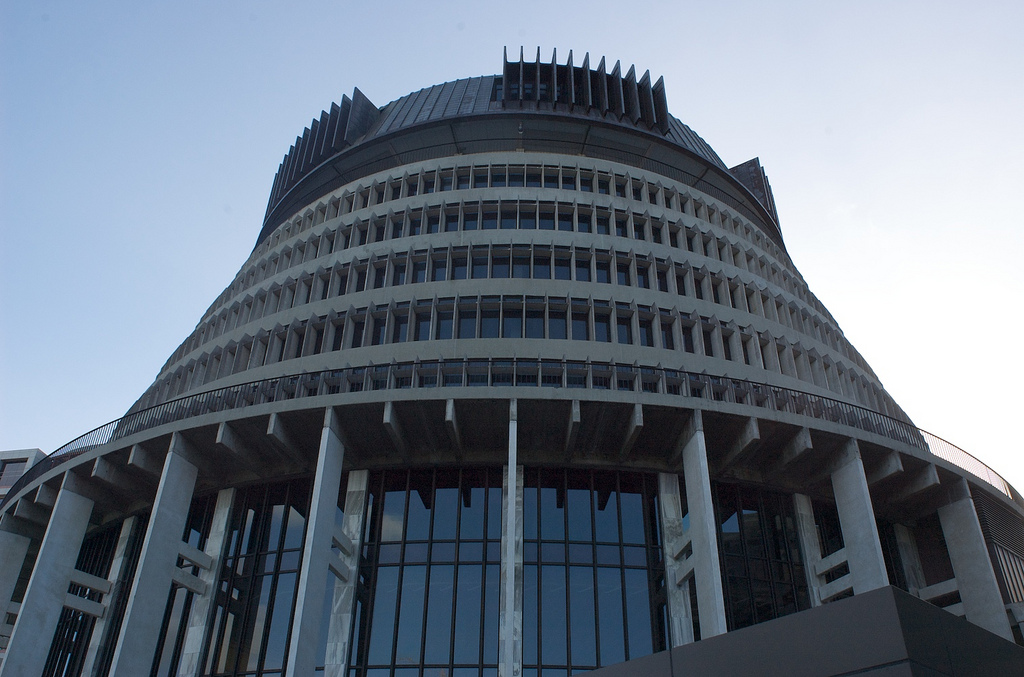Partisanship, ideology, and political system support are the most important factors influencing voters’ electoral system preference
The 2011 AV referendum demonstrated the difficulty of enacting electoral reform through public mobilisation, and changes in electoral rules usually result from elite discussions rather than citizen demands. However, New Zealand represents an example of voters pushing through a new electoral system against the will of reluctant politicians. Willy Jou explores factors that affected New Zealand citizens’ electoral system preferences by analysing voters surveys over a 15-year period, and finds that voters who identify with smaller parties, identify themselves as left-of-centre, or express discontent with the functioning of democracy consistently favoured a proportional system over first-past-the-post, whereas trust in government and assessment of economic conditions (as a proxy for government.
The rejection of AV in the 2011 referendum underlines the difficulty of achieving electoral reform through public mobilisation. Similar attempts to alter electoral rules through a popular vote failed in Italy in 1999 and 2009 due to low turnout (a quorum of 50% turnout is required), and in the Canadian provinces of British Columbia (2005, 2009) and Ontario (2007) where voters opted to keep the extant first-past-the-post (FPP) system (57% of British Columbian voters supported an alternative to FTT in 2005, but this fell short of the 60% threshold).
Even in the much-touted examples of Italian referendums in 1991 and 1993, the measures approved by voters only amounted to slight modifications of existing rules, though they were endorsed by such landslide margins that some politicians felt obliged to push through a much more extensive reform package. Most electoral rule changes are the outcome of deliberations among political elites rather than demands from the mass public. Not surprisingly, those in power usually have little incentive to replace rules that allowed them to achieve their positions in the first place.
In views of this, the case of New Zealand stands out as an exceptional example of electoral reform as an expression of popular will, where public dissatisfaction with the status quo compelled reluctant politicians to act. In a 1992 referendum, an overwhelming 85% of voters rejected the existing first-past-the-post (FPP) and, among four alternative options, 65% selected the German-style mixed-member proportional (MMP) system, which retains single-member constituencies while ensuring largely proportional results (so long as a party can win a constituency or garner 5% of list votes nationwide).
Another referendum in the following year, offering a choice between FPP and MMP, saw the latter endorsed by 54% of voters despite sizeable financial advantages enjoyed by groups backing the former. MMP was duly introduced for the 1996 general election, and has been in use ever since. In 2011, yet another referendum was conducted, but this time a majority (56%) expressed a desire to keep the existing system (i.e., MMP), rendering a second question on the choice of alternatives moot. In short, ordinary citizens were responsible for adopting a new electoral system against the preference of most political and business elites, and for fending off an attempt to replace it.
Naturally, opinions on which electoral system best suits the country varied among voters. What affected their preferences? I utilised responses to a question on electoral system preference from the New Zealand Election Study surveys during the period 1996-2011, i.e. for each election conducted under MMP, to test the effect of the following factors on whether voters preferred FPP or MMP: partisanship, ideology, political efficacy, system support, government performance, value orientations, and demographics. Note that while some survey respondents wanted an unspecified substitute to both FPP and MMP, backing for a concrete alternative was always restricted to a small minority. Hence the analysis is limited to these two realistic choices.
Specifically, I expected the aforementioned factors to affect electoral system preferences in the following manner.
- partisanship: 1) voters who identify with the two big parties (National and Labour) would favour FPP, while those who support smaller parties would prefer MMP, since – just as in the UK – first-past-the-post under-represents small parties; 2) incumbent government supporters might be more positively disposed toward the system that put their parties in power than backers of opposition parties;
- ideology: 1) right-leaning voters would be inclined toward FPP which usually yields decisive single-party governments, while left-leaning voters emphasising inclusion and fairness would prefer a more proportional system; 2) voters located toward both ends of the ideological scale might opt for MMP because it offers radical parties a better chance of parliamentary representation;
- political efficacy: voters who feel that politics is too complicated to understand might prefer the more straightforward FFP, while those who feel that citizens have no say in decision-making, and that MPs are out of touch, would be dissatisfied with the status quo and thus favour replacing FFP;
- system support: voters who express discontent with how democracy is working would be more inclined toward MMP, since FPP is associated with the old political establishment;
- government performance: voters who believe that the government is doing a poor job managing the economy might seek the replacement of the current MMP system;
- value orientations: voters who value strong leadership would support FPP, since election results under MMP often necessitate negotiations and compromises in the process of government formation and policy formulation;
- finally, women and Maori voters might prefer MMP, since studies have found that a proportional system increases female and ethnic minority representation.
Results of statistical analysis show that, among these variables, the ones that exerted a substantive influence on electoral system preference over the entire period covered by this study are partisanship, ideology, system support, along with Maori ethnicity: voters who identify with smaller parties (i.e., all parties other than National and Labour), place themselves on the left side of the ideological scale, or express dissatisfaction with how democracy functions have consistently endorsed MMP over FPP. Note that these are medium- to long-term factors which are unlikely to fluctuate from one election to the next. Voters who are highly educated or feel uncomfortable with the idea of strong leadership also tend to support MMP, though these two factors did not make a significant difference in the 2011 referendum. Political efficacy had an impact on some occasions but not others, while ideological radicalism, evaluation of government performance, and gender rarely mattered.
Interestingly, supporters of governing parties (including those that were not part of the cabinet but agreed to back the government in supply and confidence motions) favoured MMP in 1999, 2002, and 2005, but opposed it in 1996, 2008, and 2011. The first three elections produced Labour-led cabinets, while in the latter three cases the centre-right National Party gained or retained office. This indicates that electoral winner/loser status in itself does not drive preferences, and its effect largely reflects partisanship and ideology.
When comparing how much of a difference each factor made on electoral system preferences, I found that the divide between left- and right-leaning voters has narrowed somewhat over time, meaning that the question of electoral rule design has become less ideologically charged. In contrast, the gap between voters who are most and least satisfied with how democracy is working has widened from the 1990s to the 2000s, and this exerted a greater impact in the 2011 referendum than any other factor analysed in my study. It is also noteworthy that the likelihood of supporting MMP on the part of voters who do not identify with any party, comprising about 40% of the survey sample, always fell between big and small party supporters.
To what extent can we generalise these results from New Zealand over the past two decades? While the question of whether factors that affected electoral system preference in New Zealand also applied to the British electorate cannot be answered without empirical data analysis, it is not difficult to draw some parallels. For example, similar to New Zealand, smaller parties in the UK such as the Liberal Democrats, SNP, Plaid Cymru, and the Greens had an electoral incentive to support AV (which is far less proportional than MMP, but more so than first-past-the-post).
Both its status as a large party and its ideological inclination made opposition to AV a natural choice for the Conservatives. This left Labour in an awkward position, as highlighted by prominent current and former Labour politicians joining both the Yes and No campaigns. Assuming that any move away from first-past-the-post can only be legitimised through popular endorsement, whether and how Labour addresses this internal divide and convinces its supporters to follow the advice of its leadership may determine future prospects of electoral reform in the UK.
—
Note: this article represents the views of the author, and not those of Democratic Audit or the LSE. It is based on an article on the same topic which appeared in Commonwealth and Comparative Politics. Please read our comments policy before posting.
—
 Willy Jou is Assistant Professor at the Waseda Institute for Advanced Study. His researcg focuses on public opinion in new democracies toward parties and political institutions, as well as support for the political system. The aim of my current project is to identify and analyze cross-national commonalities (salient issue and value cleavages) that structure patterns of party competition in East Asian democracies.
Willy Jou is Assistant Professor at the Waseda Institute for Advanced Study. His researcg focuses on public opinion in new democracies toward parties and political institutions, as well as support for the political system. The aim of my current project is to identify and analyze cross-national commonalities (salient issue and value cleavages) that structure patterns of party competition in East Asian democracies.






 Democratic Audit's core funding is provided by the Joseph Rowntree Charitable Trust. Additional funding is provided by the London School of Economics.
Democratic Audit's core funding is provided by the Joseph Rowntree Charitable Trust. Additional funding is provided by the London School of Economics.
Which voters support electoral reform, and what is their motivation for doing so? https://t.co/8sW88ElTIN
What motivates voters’ electoral system preferences? https://t.co/gldzX2sb34
Partisanship, ideology, and political system support are the most important factors influencing voters’ electoral s.… https://t.co/zgtj8YcrBN
Partisanship, ideology, political system support, and electoral reform – new post on DA today by Willy Jou https://t.co/PbgR2wVfuq
.@cknachande #US seems to me much more threatening than any other nation lately – just their 4 brothers in crime come close @democraticaudit
Partisanship, ideology, and political system support are the key factors shaping what electoral system voters prefer https://t.co/JZHbbupVeJ
Partisanship, ideology, and political system support are the most important factors influencing voters’ electoral… https://t.co/CYpfYcHoG4